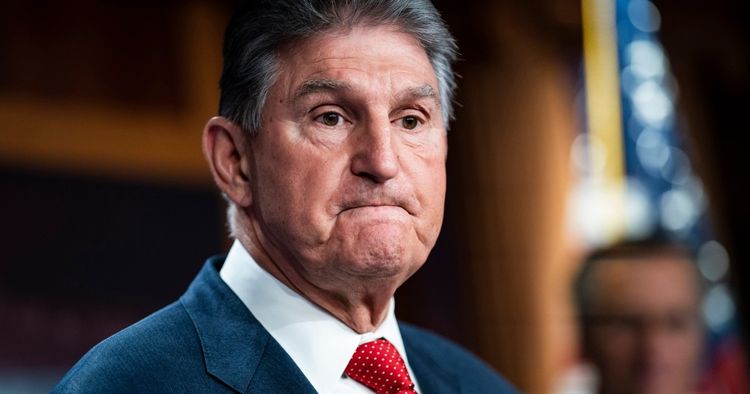Slamming Harris, Joe Manchin flunks tests on history and democracy

More than two years ago, after Republican-appointed Supreme Court justices overturned Roe v. Wade, Vice President Kamala Harris endorsed restoring the rights that the jurists took away. “If the filibuster gets in the way,” she declared in June 2022, “the Senate needs to make an exception to get this done.”
The Democrat’s position has not changed. Indeed, the Democrat reiterated her position during an interview this week with Wisconsin Public Radio. “I think we should eliminate the filibuster for Roe and get us to the point where 51 votes would be what we need to actually put back in law the protections for reproductive freedom, and for the ability of every person and every woman to make decisions about their own body, and not have their government tell them what to do,” Harris said.
Sen. Joe Manchin, who claimed to be weighing a possible endorsement of his former party’s presidential ticket, expressed fresh outrage about the position Harris announced more than two years ago. The New York Times reported:
Senator Joe Manchin III of West Virginia, an independent who considered making a presidential run this year, said on Tuesday that he would not endorse Vice President Kamala Harris after she reiterated her support for eliminating the Senate filibuster to pass abortion rights legislation. “Shame on her,” Mr. Manchin, who is not running for re-election, told CNN. “She knows the filibuster is the Holy Grail of democracy.”
As a practical matter, Manchin walking back the possibility of a Harris endorsement is unlikely to have any meaningful impact on the race: The Democratic ticket wasn’t planning to compete in the independent senator’s home state of West Virginia, and it’s not as if the senator, who’s retiring this year, has vast influence over a huge electoral contingent.
But the merits — or lack thereof — of Manchin’s comments are worth examining in more detail.
Part of the problem with the senator’s perspective is that he appears to genuinely believe in a historical record that simply does not exist in reality.
A couple of years ago, for example, Manchin told Fox News that the filibuster has been “the tradition of the Senate ... for 232 years.” A week earlier, after rejecting a Democratic voting-rights push, the West Virginian told reporters that he cared about the underlying issue, but he was even more committing to protecting “the Senate as it has operated for 232 years.”
While I’ll concede that debates over Senate procedures can be complex, and fair-minded observers can have competing opinions about tactics and strategies, there are elements of the debate that exist outside the realm of subjectivity. There are certain truths from U.S. history that simply exist. Opinions about them may vary, but they do not change what is demonstrably true.
And what is demonstrably true is that the filibuster did not exist when the Senate was created in 1789. When senators considered proposals, they held a debate and then voted. If a majority of members supported the measure it passed. The institution functioned this way for generations.
Adam Jentleson, a former top aide to the late Senate Majority Leader Harry Reid, has flagged several quotes from the nation’s Founding Fathers, noting that the Constitution’s framers considered the idea of legislative supermajorities, before ultimately rejecting them. This quote from James Madison — widely recognized as “the father of the Constitution” — is of particular interest:
“In all cases where justice or the general good might require new laws to be passed, or active measures to be pursued, the fundamental principle of free government would be reversed. It would be no longer the majority that would rule: the power would be transferred to the minority.”
Alexander Hamilton agreed.
Hamilton rebutted the idea that supermajority thresholds promote compromise, writing: “what at first sight may seem a remedy, is, in reality, a poison.” It would be wrong “to subject the sense of the greater number to that of the lesser,” because if “a pertinacious minority can control the opinion of a majority,” the result would be “tedious delays; continual negotiation and intrigue; contemptible compromises of the public good,” Hamilton wrote.
If Manchin wants to argue that the nation’s founders were wrong, fine. Have at it. If the West Virginian and those who agree with him genuinely believe that the Senate’s traditional model of legislating was wrong, it’s preferable to require supermajorities, and restoring majority rule to the institution would be a mistake, they’re welcome to make that case.
What Manchin should not do, however, is argue that his position is rooted in the Senate’s institutional history. It is not.
Proponents of filibuster reform are not looking to change the Senate, so much as they’re trying to restore the Senate to how it used to function.
As for the idea that the filibuster is necessary to protect democracy, I’m at a loss as to understand how the West Virginian arrived at such a conclusion. As things stand, with the routinization of filibuster abuses, Americans can put the House, Senate and White House in the hands of one party, only to find that party unable to approve popular legislation — backed by most voters — because of a procedural roadblock that didn’t use to exist.
Manchin is apparently convinced that this procedural roadblock helps preserve democracy. He has this backward.
For his part, Donald Trump celebrated the independent senator’s statement. “Congratulations to Senator Joe Manchin for not endorsing Radical Kamala Harris because of her DEATH WISH for the Filibuster and the Rule of Law,” the former president wrote online.
What Trump neglected to mention is that he’s repeatedly called for the elimination of the Senate’s filibuster rule, making his missive about Manchin that much more ridiculous.
This post updates our related earlier coverage.















































